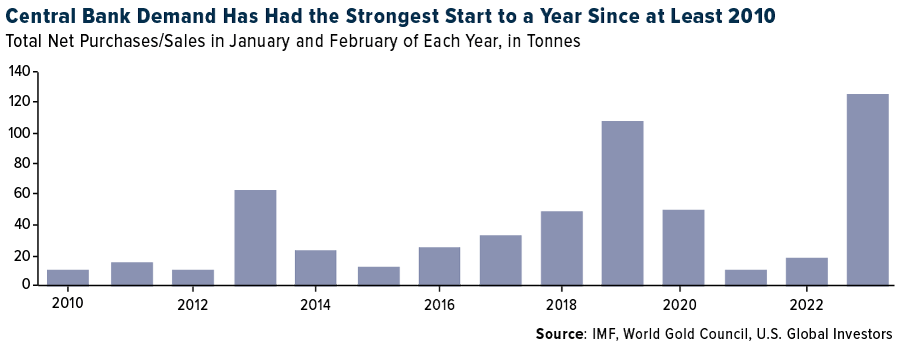Watchman Warning: America Is Done: It’s Biblical, Everybody Wants To Hop On The BRICS Express—End of an Age

HNewsWire:
In a move expected to fuel the ongoing de-dollarization trend, the BRICS nations (Brazil, Russia, India, China, and South Africa) have announced plans to introduce a new trading currency backed by gold. The official announcement is slated to take place during the BRICS summit in South Africa in August.
This development comes as central banks worldwide have been increasing their gold reserves to diversify away from the U.S. dollar—especially those belonging to the BRICS nations. In fact, the Chinese and Russian central banks have purchased no less than 130 tons of gold in Q1 and Q2 2023 alone. In 2022, global central banks added at least 400 tons to their reserves.
Analysts view the potential gold-backed currency as a significant step toward challenging the dominance of the U.S. dollar and increasing the international credibility of the Chinese yuan. Geopolitical uncertainty stemming from the U.S. government’s use of the dollar as a weapon against Russia’s actions in Ukraine has also contributed to the interest in alternative currencies.
What the Experts Have to Say
While this announcement is expected to bolster the price of gold, experts anticipate that the market impact will take time to materialize. Thorsten Polleit, Chief Economist at Degussa, points out that while a gold-backed currency sounds promising, the key lies in the details. To truly establish the new currency as sound money, it must be convertible into gold on demand. Polleit questions whether this is the intention of the BRICS nations and emphasizes the need for more information.
Another possibility suggested by Polleit is the creation of a new bank for financing foreign trade that requires holding gold as capital. This bank could issue the new currency and provide financing loans to exporters or facilitate the sale of BRICS exports against the new currency or gold.
While the gold-backed currency proposal has the potential to support gold in the long run, short-term challenges persist. Naeem Aslam, Chief Investment Officer at Zaye Capital Markets, highlights that the world is still far from seeing a gold-backed currency. Nevertheless, positive news related to this development could bolster the gold price.
Although skeptics, such as Marc Chandler, Managing Director of Bannockburn Global Forex, doubt the feasibility of the BRICS nations having enough gold to back the currency meaningfully, discussions about challenging the U.S. dollar’s status as the world’s reserve currency have been ongoing. Former Goldman Sachs chief economist Jim O’Neill has previously argued that a BRICS currency could bring stability to the global economy and address the destabilizing impact of the U.S. dollar’s dominance.
As the gold market reacts to this news, traders will also closely monitor upcoming inflation risks and U.S. CPI data for short-term price direction. While the full implications of a gold-backed currency remain uncertain, the announcement underscores the growing quest for alternatives to the U.S. dollar and sets the stage for potential shifts in the global monetary landscape.
BRICS, Dedollarization, and the Role of a Gold-Backed Currency
BRICS countries have expressed a keen interest in de-dollarization as they aim to reduce their reliance on the U.S. dollar and assert greater control over their economies.
Several motivations are at play for the BRICS states, including the desire to mitigate vulnerabilities associated with dollar-dominated global financial systems and to enhance economic sovereignty. The upcoming gold-backed common currency within the BRICS bloc is seen as a significant step towards achieving the following objectives.
1. Economic Sovereignty
By reducing dependence on the U.S. dollar, BRICS countries seek to enhance their economic sovereignty and reduce exposure to potential disruptions in global markets. The U.S. dollar’s dominance in international trade and finance can leave nations vulnerable to fluctuations in its value, monetary policy decisions made by the U.S. Federal Reserve, and the potential use of the dollar as a geopolitical tool.
The BRICS nations aim to strengthen their autonomy by diversifying their currency reserves and promoting the use of alternative currencies, thereby gaining greater control over their monetary policies and economic stability.
2. Trade Facilitation
The introduction of a gold-backed common currency among BRICS countries is expected to facilitate trade within the bloc and minimize currency exchange risks. Currently, cross-border trade between BRICS nations often involves multiple currency conversions, transaction costs, and exposure to foreign exchange fluctuations.
A gold-backed currency would provide a stable medium of exchange and promote seamless trade settlement in a common currency, reducing transaction complexities and fostering economic integration among BRICS nations. This would enhance intra-BRICS trade, improve economic cooperation, and potentially strengthen the bloc’s position in global trade negotiations.
3. Greater Financial Resilience
A gold-backed currency within the BRICS bloc can bolster financial resilience by providing a hedge against potential currency crises and market uncertainties. Gold has long been viewed as a store of value and a safe haven asset during times of economic turmoil.
By backing their currency with gold, BRICS countries can instill confidence among market participants, both domestically and internationally, in the stability and intrinsic value of their common currency. This can contribute to increased trust and stability within the BRICS financial systems, attract foreign investment, and potentially reduce their vulnerability to external shocks.
Gold: A Central Role in a De-dollarized Future
Although representatives of the BRICS nations have been scant on details, one thing is for certain: the currency will be pegged to the value of gold. No matter one’s political persuasion, it’s hard to deny the centrality of gold in tomorrow’s global economy.
BRICS countries’ interest in de-dollarization stems from their aspirations for economic sovereignty, reduced vulnerability to global financial disruptions, and increased control over their monetary policies. The introduction of a gold-backed common currency is a major step forward in achieving that objective.
The introduction of a gold-backed common currency within the BRICS bloc aligns with these goals by promoting economic integration, enhancing trade facilitation, and providing financial resilience. The currency’s potential to advance the de-dollarization agenda among BRICS nations highlights its determination to shape a more diversified and robust global monetary landscape.
While central banks and BRICS countries are loading up on gold, you may want to consider doing the same. To invest in gold today, consider opening a tax-advantaged gold retirement account with one of America’s top-rated gold IRA companies.

Ethiopia Joins Egypt in Seeking BRICS Membership
HNewsWire: Ethiopia has joined Egypt and Algeria in applying to become a member of Brazil, Russia, India, China and South Africa (BRICS) economic bloc. According to the Ethiopian Foreign Affairs Ministry, joining the bloc would help the country guarantee its national interests.
Safeguarding Ethiopian National Interests
Ethiopia, which has one of Africa’s fastest-growing economies, has become the latest African country to seek to join the Brazil, Russia, India and South Africa (BRICS) economic bloc. The North East African country, which has waged a bloody war against Tigray rebels, joins Egypt and Algeria in seeking to join BRICS.
According to a report in The East African, the country’s Foreign Affairs ministry believes joining a global institution such as BRICS will help advance Ethiopian national interests.
“As a country that has been a founding member of global institutions like the AU [African Union] and the UN [United Nations], and as we seek to guarantee our national interests, it is important to join blocs like BRICS,” the ministry reportedly said.
Ethiopia, like its counterpart Egypt, has grappled with shortages of foreign exchange and has seen the gap between the official and parallel market exchange rate of its currency versus the U.S. dollar widen to a record high. The National Bank of Ethiopia (NBE) has attempted to remedy the situation by imposing limits on the amount of U.S. dollars that residents can take outside the country.
However, by joining BRICS which is planning to launch an alternative reserve currency, Ethiopia hopes to reduce its dependence on the greenback. The country’s wish to join BRICS is coming at a time when some African nations are seeking to diminish the influence of the U.S. dollar in infra-continental trade. Source: BitCoin

Say hello to Granite Ridge Soap-works! Use our handmade soaps to take good care of your skin. Our premium natural ingredients work together to create a silky, creamy lather that hydrates your skin. Chemicals, such as sodium lauryl sulfate, phthalates, parabens, or detergents, are never used by us. To ensure quality, we make all of our soaps in modest quantities. Visit our Etsy store right away to give them a try and the attention your skin deserves. GraniteRidgeSoapworks: Because only the best will do for your skin.
Use the code HNEWS15 to receive 15% off your first purchase.

HNewsWire: Last week, a Russian official announced that the BRICS nations are working to develop a “new currency,” yet another sign that dollar dominance is waning.
Alexander Babakov, vice-president of the State Duma (the Russian legislature), stated that the transition to settlements in national currencies is the initial step. Recent oil transactions between India and Russia have already been settled in currencies other than dollars.
In the near future, the subsequent one will facilitate the circulation of digital or any other form of a fundamentally new currency. I believe that the readiness to implement this project will be announced at the BRICS [leaders summit]; preparatory work is already underway."
This meeting is planned for August.
Babakov stated that the BRICS nations are developing a strategy that "does not defend the dollar or euro" and that "a single currency" pegged to gold or "other groups of products, rare-earth elements, or soil" will likely emerge within BRICS.
BRICS consists of Brazil, Russia, India, China, and South Africa. It comprises approximately 40% of the global population and 25% of the global GDP.
According to a report published by The Cradle, several nations, including Saudi Arabia, Algeria, the United Arab Emirates, Egypt, Argentina, Mexico, and Nigeria, have expressed interest in joining the bloc.
Jim O'Neill, the former chief economist of Goldman Sachs, coined the BRIC acronym. In a recent Global Policy Journal article, he advocated for the expansion of BRICS.
He wrote, "The US dollar is far too dominant in global finance."
When the Federal Reserve Board has engaged in periods of monetary tightening or the opposite, monetary easing, the dollar's value and subsequent effects have been dramatic.
Clearly, many countries are attempting to reduce their dollar exposure.
The US government's profligate borrowing, spending, and money creation continue to erode confidence in the dollar. As a result of America's use of the dollar as a foreign policy tool, many nations are wary of relying solely on the dollar.
According to the International Monetary Fund (IMF), the dollar's share of global foreign-exchange reserves fell below 59% at the end of 2021, extending a decline of two decades.
Notably, the decline in the dollar's share has not been accompanied by an increase in the shares of other long-standing reserve currencies, such as the pound sterling, the yen, or the euro...
Rather, the shift away from dollars has occurred in two different directions: one-quarter into the Chinese renminbi and three-quarters into the currencies of smaller countries that have played a lesser role as reserve currencies."
This is a major issue for the United States government.
Uncle Sam's profligate borrowing and expenditures are supported by the demand for dollars. The only reason the United States can get away with massive budget deficits and an ever-growing national debt is because the dollar is the world's reserve currency. It generates an inherent global demand for dollars and US Treasury bonds, which absorb the money creation and preserve the dollar's strength. But what if this demand decreases? What happens if BRICS creates its own currency and no longer needs the dollar?
If demand for dollars plummets, the dollar's value will rapidly decline. This will result in increased price inflation for Americans. And in the worst-case scenario, the dollar could completely collapse.



HNewsWire: To the detriment of the West, Eurasia is about to grow significantly as countries line up to join the Chinese and Russian-led BRICS and SCO...
Let us begin with a tale of Global South trade between two Shanghai Cooperation Organization members (SCO). At its core is the already infamous Shahed-136 drone - or Geranium-2, as it is known in Russia: the AK-47 of postmodern aerial warfare.
In yet another ironic fit of panic, the US accused Tehran of weaponizing the Russian Armed Forces. The superstar, value-for-money, and incredibly effective drone unleashed on the Ukrainian battlefield is a state secret for both Tehran and Moscow: its deployment sparked a flurry of denials from both sides. It makes no difference if these drones are manufactured in Iran or if the design was purchased and manufactured in Russia (the more likely scenario).
The record reveals that the US uses Ukraine as a weapon against Russia.
The Empire operates as a de facto warfighter through a network of "consultants," advisers, trainers, mercenaries, heavy weaponry, munitions, satellite intelligence, and electronic warfare. Despite this, imperial officials insist they are not involved in the fight. They're lying yet again.
Welcome to another vivid example of the "rules-based international order" in action. The Hegemon determines which regulations apply and when. Anyone who opposes it is an enemy of "freedom," "democracy," or whatever platitude is in vogue, and should be punished with arbitrary consequences.
For decades, the predictable conclusion in the case of sanctioned-to-oblivion Iran has been another round of sanctions. That is unimportant. What counts is that, according to Iran's Islamic Revolutionary Guard Corps (IRGC), no less than 22 nations - and counting - are joining the queue to get in on the Shahed action.
Even the Leader of the Islamic Revolution, Ayatollah Ali Khamenei, jumped into the battle, remarking that the Shahed-136 is no Photoshop.
The race for BRICS+
What the fresh sanctions on Iran "achieved" was to inflict another blow to the increasingly challenging signature of the renewed nuclear deal in Vienna. More Iranian oil on the market would actually alleviate Washington's predicament following OPEC+'s recent catastrophic rebuff.
However, a categorical imperative persists. Iranophobia, like Russophobia, is a constant for the Straussians/neo-cons in command of US foreign policy and their European vassals.
So we have yet another aggressive escalation in both Iran-US and Iran-EU ties, as Brussels' unelected junta also sanctioned producer Shahed Aviation Industries and three Iranian generals.
Compare this to the fate of Turkey's Bayraktar TB2 drone, which, unlike the "flowers in the sky" (Russia's Geraniums), has failed terribly in combat.
Kiev attempted to persuade the Turks to use a Motor Sich weapons facility in Ukraine or form a new firm in Transcarpathia/Lviv to manufacture Bayraktars. Because of his ties to Russia, Motor Sich's oligarch President Vyacheslav Boguslayev, 84, has been charged with treason and may be traded for Ukrainian prisoners of war.
In the end, the deal fell through due to Ankara's unwavering commitment to establishing a new gas hub in Turkey, a personal request from Russian President Vladimir Putin to his Turkish counterpart Recep Tayyip Erdogan.
This brings us to the developing connectivity between the BRICS and the 9-member SCO, to which this Russia-Iran military commerce is intimately related.
The Shanghai Cooperation Organization (SCO), led by China and Russia, is a pan-Eurasian organisation that was founded to combat terrorism but is now increasingly focused on geoeconomic - and geopolitical - cooperation. The notion of BRICS+, studied in length in a recent Valdai Club paper, and fully endorsed by the Russia-China strategic alliance, overlaps with the SCO agenda geoeconomically and geopolitically, expanding it to Africa, Latin America, and beyond.
The paper evaluates the benefits and drawbacks of three scenarios involving potential BRICS+ candidates:
First, states invited by Beijing to participate in the 2017 BRICS summit (Egypt, Kenya, Mexico, Thailand, Tajikistan).
Second, nations that participated in this year's BRICS foreign ministers conference in May. (Argentina, Egypt, Indonesia, Kazakhstan, Nigeria, UAE, Saudi Arabia, Senegal, Thailand).
Third, important G20 economies (Argentina, Indonesia, Mexico, Saudi Arabia, Turkiye).
Gog and Magog Have Taken Shape, Saudi Arabia Seeks to Join the Russia/China-Led Brics Coalition, and America Will Cease to Exist Once This Event Occurs, Tribulation Warp Speed!
Then there's Iran, which has already expressed interest in joining the BRICS.
South African President Cyril Ramaphosa has stated that "many countries" are desperate to join BRICS. Among them is Saudi Arabia, a key power in West Asia.
What's more, only three years ago, under former US President Donald Trump's administration, the kingdom's de facto ruler, Crown Prince Muhammad bin Salman (MbS), was dead intent on joining a type of Arab NATO as a favoured imperial partner.
Diplomatic sources corroborate that MbS's envoys began serious negotiations with both Moscow and Beijing the day after the US withdrew from Afghanistan.
If the BRICS support Riyadh's candidacy in 2023 with the necessary unanimity, the petrodollar will face seismic implications. At the same time, it is critical not to underestimate the power of US foreign policy controllers.
The petrodollar is the only reason Washington tolerates Riyadh's rule. The Saudis must be denied the right to pursue an independent, truly sovereign foreign policy. If this occurs, the geopolitical realignment will affect the entire Persian Gulf, not just Saudi Arabia.
Yet, when OPEC+ de facto picked the BRICS/SCO course lead by Russia-China - in what can be regarded as a "soft" prologue to the end of the petrodollar - this seems increasingly likely.
Even before Saudi Arabia, the Riyadh-Tehran-Ankara trio Iran expressed interest in joining BRICS. According to diplomatic sources in the Persian Gulf, they are already working through a rather hidden channel via Iraq to get their act together. Turkey will soon follow - at least on the BRICS and possibly on the SCO, where Ankara is currently a particularly keen observer.
Imagine this triangle - Riyadh, Tehran, and Ankara - tightly allied with Russia, India, and China (the actual core of the BRICS), and eventually in the SCO, where Iran is the only West Asian nation to have been admitted as a full member.
The strategic blow to the Empire will be out of this world. The debates building up to BRICS+ are centered on the difficult path toward a commodity-backed global currency capable of bypassing the US dollar's dominance.
Several interconnected steps lead to increased collaboration between BRICS+ and SCO. Members of the latter have already agreed on a timetable for gradually boosting trading in national currencies in mutual settlements.
The State Bank of India, the country's largest lender, is introducing special rupee accounts for Russian commerce.
Russian natural gas to Turkey will be paid in rubles and Turkish liras, with Erdogan personally requesting a 25% discount from Putin.
VTB, a Russian bank, has begun sending money to China in yuan, bypassing SWIFT, and Sberbank has begun lending in yuan. Russian energy powerhouse Gazprom agreed with China that gas delivery payments will be split evenly in rubles and yuan.
Iran and Russia are integrating their banking systems to facilitate trading in rubles/rials.
Egypt's Central Bank is attempting to create an index for the pound using a group of currencies and gold in order to wean the national currency away from the US dollar.
Then there's the TurkStream debacle.
That gas station present
Ankara has spent years attempting to establish itself as a privileged East-West gas center. Following the destruction of the Nord Streams, Putin has given Turkey the option of increasing Russian gas supplies to the EU via such a hub. According to the Turkish Energy Ministry, Ankara and Moscow have already achieved an agreement in principle.
In actuality, Turkey will control the flow of gas to Europe not only from Russia, but also from Azerbaijan and a large portion of West Asia, possibly including Iran, as well as Libya in northeast Africa. The network could be completed by LNG terminals in Egypt, Greece, and Turkiye.
The TurkStream and Blue Stream pipelines transport Russian gas. Russian pipelines have a total capacity of 39 billion cubic meters per year.
TurkStream was originally intended to be a four-strand pipeline with a nominal capacity of 63 million cubic meters per year. As of now, just two strands have been developed, with a total capacity of 31,5 billion cubic meters.
So, in theory, an extension is more than doable - with all of the equipment built in Russia. Once again, the issue is laying the pipes. The required vessels are owned by the Swiss Allseas Group, and Switzerland is involved in the sanctions hysteria. Russian warships were utilized to complete Nord Stream 2 construction in the Baltic Sea. However, a TurkStream extension would require them to operate far deeper in the ocean.
TurkStream cannot totally replace Nord Stream because it transports far lesser amounts. The benefit for Russia is that it will not be barred from the EU market. Evidently, Gazprom would only undertake the significant investment in an extension if there were absolute guarantees concerning its security. There's also the issue that the extension would bring gas from Russia's competitors.
Whatever happens, the truth is that the US-UK alliance still has considerable power in Turkey, and BP, Exxon Mobil, and Shell, for example, are involved in practically every oil extraction project in West Asia. As a result, they would undoubtedly interfere with the operation of the Turkish gas hub as well as the determination of gas prices. Before committing to such a project, Moscow must consider all of these factors.
NATO, predictably, will be furious. But never underestimate Sultan Erdogan, a hedging bet master. His love story with the BRICS and the SCO is just getting started.
HNewsWire: The BRICS coalition, which includes Brazil, Russia, India, China, and South Africa, focuses mostly on trade discussions, while it has also reached agreements on security issues such as counterterrorism. Despite increased tensions between members over the last decade, particularly between India and China, whose military fought in conflict over their shared border in 2020, the coalition has held.
The BRICS alliance also held despite the election of a self-proclaimed conservative president, Jair Bolsonaro, who radically shifted the focus of domestic politics from what it was when far-left socialist President Luiz Inácio Lula da Silva helped create the coalition in 2009. Despite campaigning on anti-communism in 2018, Bolsonaro has generally maintained close connections with China and has remained neutral in Russia's invasion of Ukraine, strongly opposing sanctions against Moscow.


 Source: US Global Investors
Source: US Global Investors
